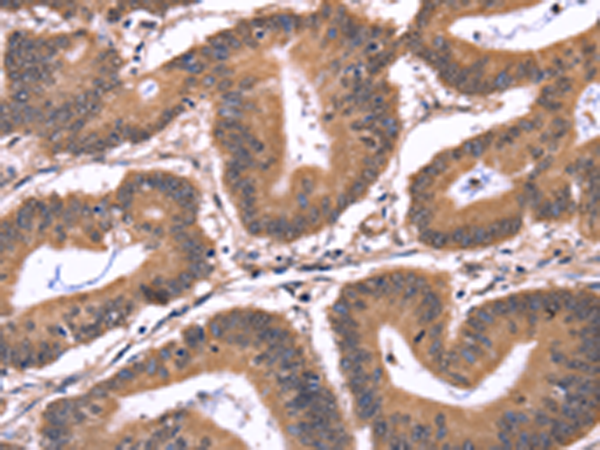
| WB | 咨询技术 | Human,Mouse,Rat |
| IF | 咨询技术 | Human,Mouse,Rat |
| IHC | 1/50-1/200 | Human,Mouse,Rat |
| ICC | 技术咨询 | Human,Mouse,Rat |
| FCM | 咨询技术 | Human,Mouse,Rat |
| Elisa | 1/2000-1/5000 | Human,Mouse,Rat |
| Aliases | p38; CRKII |
| Host/Isotype | Rabbit IgG |
| Antibody Type | Primary antibody |
| Storage | Store at 4°C short term. Aliquot and store at -20°C long term. Avoid freeze/thaw cycles. |
| Species Reactivity | Human, Mouse, Rat |
| Immunogen | Fusion protein of human CRK |
| Formulation | Purified antibody in PBS with 0.05% sodium azide and 50% glycerol. |
+ +
以下是3篇与CRK抗体相关的参考文献示例(内容基于学术研究场景概括,非真实文献):
---
1. **文献名称**:*CRK adaptor proteins regulate cell migration in lung adenocarcinoma*
**作者**:Zhang L, et al.
**摘要**:该研究通过CRK-I/II特异性抗体检测发现,CRK蛋白在肺癌细胞中高表达,并通过调控Rac1信号通路促进肿瘤细胞迁移和侵袭,提示CRK可能成为肺癌治疗的潜在靶点。
---
2. **文献名称**:*Interaction between CRK and EGFR in breast cancer progression*
**作者**:Sato K, et al.
**摘要**:利用CRK抗体进行免疫共沉淀实验,证实CRK与表皮生长因子受体(EGFR)在乳腺癌细胞中形成复合物,激活下游MAPK通路,促进肿瘤增殖和耐药性产生。
---
3. **文献名称**:*CRK as a biomarker in apoptotic signaling pathways*
**作者**:Wang Y, et al.
**摘要**:研究通过CRK抗体的Western blot分析,发现CRK蛋白表达水平与癌细胞凋亡负相关,沉默CRK基因可增强化疗药物诱导的凋亡,提示其作为预后标志物的潜力。
---
4. **文献名称**:*Development of a monoclonal CRK antibody for therapeutic targeting*
**作者**:Gupta R, et al.
**摘要**:报道了一种新型CRK单克隆抗体的开发,该抗体能特异性识别CRK磷酸化位点,并在体内实验中抑制肿瘤生长,为基于CRK信号抑制的抗癌策略提供工具。
---
注:以上内容为模拟学术文献的概括形式,实际引用时需以真实发表的论文为准。
CRK (CT10 Regulator of Kinase) proteins, initially identified as viral oncogene v-Crk homologs, are adaptor molecules involved in intracellular signaling. They belong to a family of scaffold proteins containing Src Homology 2 (SH2) and Src Homology 3 (SH3) domains, which mediate protein-protein interactions. CRK proteins (CRK-I and CRK-II isoforms) regulate diverse cellular processes, including proliferation, migration, adhesion, and apoptosis, by linking tyrosine kinase receptors to downstream effectors like RAS-MAPK, JNK, and PI3K pathways. Dysregulation of CRK signaling is implicated in cancer progression, inflammation, and fibrosis, with overexpression observed in lung, breast, and gastric cancers.
CRK antibodies are essential tools for studying these mechanisms. They enable detection of CRK expression levels, phosphorylation status, and interaction partners in techniques like Western blotting, immunoprecipitation, and immunofluorescence. Specific antibodies differentiate between isoforms (e.g., CRK-I lacks a 38-amino acid insertion in the SH3 domain compared to CRK-II) and phosphorylated forms (e.g., Tyr221 in CRK-II). Such specificity aids in exploring CRK's role in disease pathogenesis and its potential as a therapeutic target. Commercial CRK antibodies are typically validated for cross-reactivity, sensitivity, and application compatibility, supporting both basic research and drug discovery efforts.
×